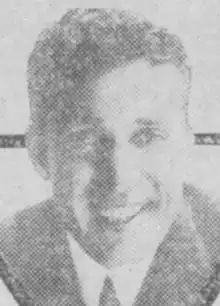Billie Ritchie
William Hill, known professionally as Billie Ritchie (5 September 1874 – 6 July 1921), was a Scottish comedian who first gained transatlantic fame as a performer for British music hall producer Fred Karno — thus, a full decade before Stan Laurel and Charlie Chaplin took a similar career path. Ritchie is best recalled today for the silent comedy shorts he made between 1914 and 1920 for director/producer Henry Lehrman's L-KO Kompany and Fox Film Sunshine Comedy unit.
Billie Ritchie | |
|---|---|
 | |
| Born | William Hill[1] 5 September 1874 |
| Died | 6 July 1921 (aged 46) |
| Nationality | Scottish |
| Spouse | Winifred Frances Kirby |
| Children | 1 |

Biography
In 1906-1908 and again in 1911-1913, Ritchie toured in Lee Orean Smith's musical Around the Clock in which he starred as the drunk Billie Smith.[2] Variations on Ritchie's "tramp" and "drunk" personae – which Ritchie claimed he had developed before and during his Karno years – were introduced to film audiences by Charlie Chaplin in such shorts as the Lehrman-directed Kid Auto Races at Venice (7 February 1914) and Mabel's Strange Predicament (9 February 1914).
Ritchie, who, due to a series of on-set injuries, spent his final years relatively inactive, succumbed to stomach cancer in the summer of 1921.[3] Winifred Frances, the comedian's widow, and one-time stage partner, wound up in the employ of Charlie Chaplin as a wardrobe mistress, showing there was no animosity between the two performers.[4] Wyn Ritchie, their daughter, was also a performer, and, in private life, the wife (for 55 years) of songwriter Ray Evans.
In popular culture
In 1918 Dutch illustrator David Bueno de Mesquita created a comic book about Ritchie named Billie Ritchie en Zijn Ezel (Billie Ritchie and his Donkey). This was the first celebrity comic in Dutch history.[5]
Notes
- Steve Massa- Lame Brains and Lunatics pp.55
- Reeder, Thomas. "'The L-Ko Komedy Kompany': Lehrman's Baby". Mr. Suicide: Henry Pathé Lehrman and The Birth of Silent. Bear Manor Media. ISBN 978-1629331621.
- Steve Massa- Lame Brains and Lunatics pp. 66-67
- Steve Massa- Lame Brains and Lunatics pp. 67-68
- "David Bueno de Mesquita".
References
- Massa, Steve (30 April 2013). Lame Brains and Lunatics: The Good, The Bad, And The Forgotten of Silent Comedy (pp. 55-68). BearManor Media. ISBN 978-1593932688.
External links
- Billie Ritchie at IMDb
- Billie Ritchie at Find a Grave
- Winifred Monroe Ritchie at IMDb
- Wyn Ritchie Evans at IMDb
- Wyn Ritchie at the Internet Broadway Database
- The Ray and Wyn Ritchie Evans Foundation Official Website
- Wyn Ritchie Evans Papers- University of Pennsylvania Archived 9 January 2014 at the Wayback Machine